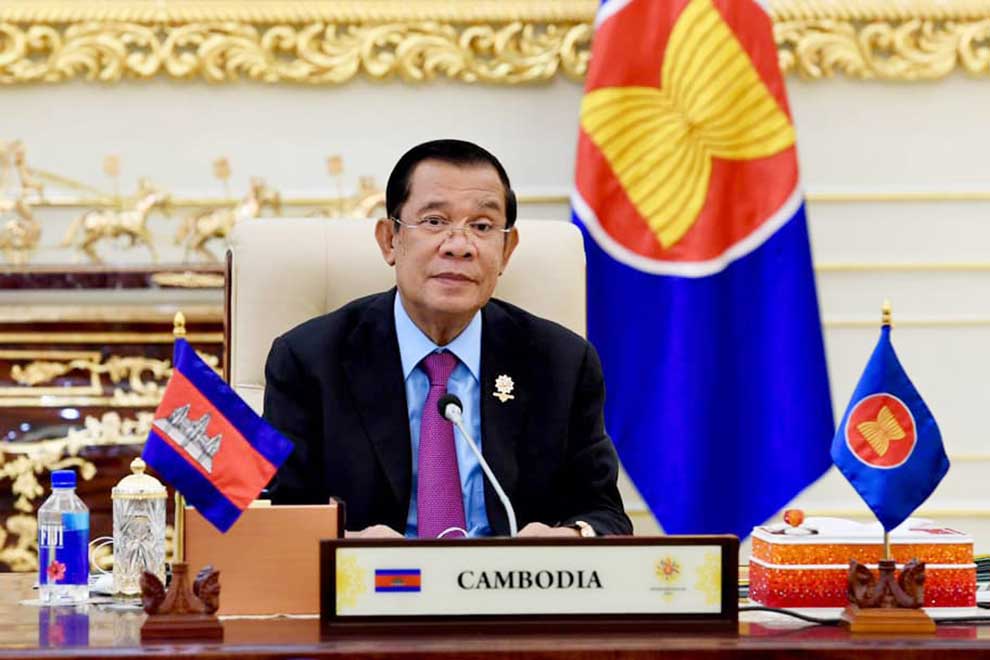
Prime Minister Hun Sen attending the combined 38th and 39th ASEAN summits virtually on October 26. SPM
Prime Minister Hun Sen said the prolonged Covid-19 pandemic over the past two years had been a challenging period for the Cambodian government as well as the rest of ASEAN – but one that he felt was nearing its end soon because ASEAN’s feet were now planted firmly on the path leading to a post-pandemic recovery era.
Hun Sen made the remarks while attending the 38th and 39th ASEAN Summits, combined together and held online due to the pandemic, on October 26.
This year’s theme was We care, we prepare, we prosper, and the duo of summits that normally would be held separately and several months apart from each other were instead done this year as one event hosted by Brunei via video conference.
“The prolonged Covid-19 pandemic over the past two years was a major test of our abilities to lead and develop the whole of ASEAN and each ASEAN member state. At this point I believe we can now make the assessment that ASEAN will be able to get back on track and effectively control the spread of this disease in the near future,” Hun Sen said.
All of ASEAN’s top leaders were in virtual attendance with the exception of Myanmar – whose participation was suspended due to the ongoing civil strife there following a military coup.
Leadership delegations from each ASEAN member nation gather at these summits twice yearly in non-pandemic years to discuss issues of common concern and further develop ASEAN as a community.
This year’s discussions centred on the response to Covid-19 and the bloc’s external relations with major regional powers and the world’s two superpowers as related to the principle of ASEAN centrality, as well as thorny regional issues such as Myanmar’s political crisis and the ongoing dispute over China’s claims to the South China Sea.
Hun Sen stated that ASEAN’s objectives now should be an economic recovery where they “build back better” and the reinforcement of the socio-economic foundations through the normalisation of trade flows, opening up of travel and implementation of policies that would further the liberalisation of trade, services and investment.
He said that in the fight against Covid-19, the Cambodian government decided very early on to pursue a strategy of vaccinations first and foremost while also implementing other measures to mitigate the spread of the disease until that was achieved.
He noted that as of October 22, Cambodia had vaccinated 13.7 million people, or about 85 per cent of the country’s total population of around 16 million, along with all of the Kingdom’s foreign residents and guests.
“The Covid-19 disease in Cambodia is now assessed to be well under control. On this basis, the government has been gradually reopening socio-economic activities within the context of the ‘new normal’ and we also plan to lay out our recovery strategies to foster Cambodia’s economic growth as we approach the end of the year,” he said.
This year’s summits produced a joint declaration from ASEAN’s leaders on upholding the principles of multilateralism and ASEAN centrality, improving global public health and ensuring equitable access to vaccines and ASEAN’s firm commitment to free trade and a rules-based multilateral trading system.
Hun Sen is scheduled to speak again at the closing ceremonies for the summits on October 28, as Cambodia is set to take over the ASEAN chairmanship for 2022 from the current chair Brunei.
Cambodia’s chairmanship of ASEAN in 2022 means that the country will be hosting these summits and a number of other important ASEAN gatherings over the course of the year, whether they are held virtually or in-person.
Kin Phea, director of the Royal Academy of Cambodia’s International Relations Institute, said Cambodian diplomats should urge Myanmar’s military leaders to compromise and accept the five-point consensus previously agreed upon at the special meeting of ASEAN’s leaders on April 24 in order to move that crisis towards resolution before it deepens further.
“Cambodia should try to do something to help, perhaps by using back-channel diplomacy with the Myanmar junta to get them to accept the terms – maybe by drawing upon and sharing Cambodia’s experience with political rapprochement achieved through Prime Minister Hun Sen’s win-win policy,” he told The Post.
The five-point consensus on Myanmar reached by ASEAN earlier this year called for an immediate cessation of all violence and the exercise of utmost restraint by all sides and the opening of constructive dialogue between the parties to find a peaceful solution with a special envoy of the ASEAN chair facilitating and mediating that process.
The implementation of that consensus was to begin with ASEAN providing humanitarian assistance through the Secretary-General’s office and the special envoy and a delegation of ASEAN diplomats would at the same time travel to Myanmar to meet with all of the parties to the conflict.
Myanmar’s dismissive response to the five-point consensus – which led to its exclusion from this year’s ASEAN summits – was that ASEAN’s “suggestions” were “constructive” but the military government there was more concerned with maintaining law and order at present and could only take the matter under consideration once “peace and tranquillity” were restored.











